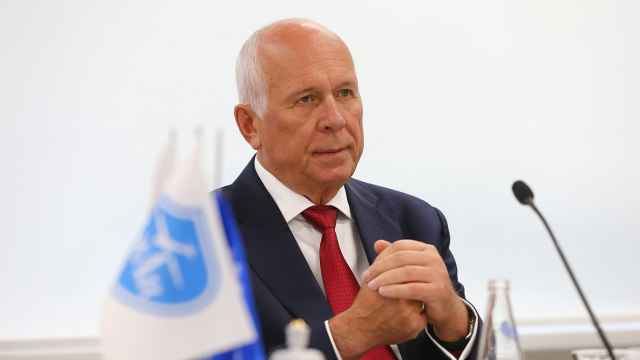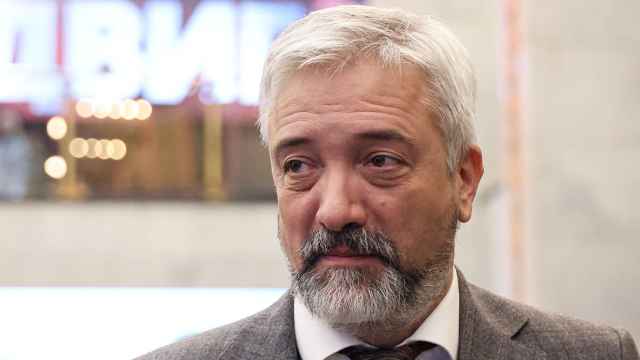Russian investment banking activity has been hit this year by the faltering economy and the Ukraine crisis, putting pressure on Moscow bankers to get creative in offering local firms different ways to raise capital instead of the standard fare of international share and bond issues.
Russian investment banking fee income has fallen by about a third to $166 million in the year to date compared with the same period last year, with a marked squeeze in the last few months, according to Thomson Reuters data.
The imposition of U.S. and EU sanctions on some Russian individuals and firms caused a sell-off in the ruble and equity markets, forcing many companies to postpone plans to raise equity and debt capital and raising fears amongst local investment bankers about potential job cuts.
Some banks have already reallocated staff, said one Moscow-based banker, who asked not to be named. "Some people primarily or solely focused on Russia are now not on Russia any more. Some people have moved back to London and don't do Russia any more or do Russia as part of a broad scope," he said.
Major U.S. and European investment banks such as Goldman Sachs, JPMorgan, Morgan Stanley and Deutsche Bank have built up prominent businesses in Moscow, where they work alongside or compete with state-controlled banks Sberbank and VTB for work on mergers and acquisitions, or M&A, share issues and debt capital markets.
"It became evident that growth slowed considerably," said a second banker who spoke on condition of anonymity. "So I think there are quite a few firms that are probably making assessments on these events regarding staffing."
Deal Drought
Russian economic growth is expected to grind to a near-halt this year while capital outflows during the first quarter totaled $63.7 billion — more than during the whole of 2013 — partly as companies and households switched into foreign currencies.
President Vladimir Putin has told company bosses to bring their assets home to help Russia survive Western sanctions and the downturn, and has backed a drive to promote the Moscow Exchange. And as if on cue, shares in Nasdaq-listed Russian internet search engine Yandex began trading in Moscow on Wednesday.
But Bernard Sucher, board member of Russian investment group Aton, said banks would still need to cut costs — mainly meaning staff — in order to "get through the desert."
Investment banking fees in Russia for May came to just $44.6 million, compared with $75.7 million the same month last year, Thomson Reuters data showed.
One lawyer who is leaving Moscow said law firms would probably put off making any redundancies until early next year once it is clear how 2014 shaped up, but cautioned it could be tough for expatriates, many of whom come from London, seeking employment back at home. Russian companies have tended to raise foreign capital in London, partly due to its proximity and close timezone with Moscow and its deep and liquid markets.
"A lot of people will find it hard to get back in the market in London as it is full of good bankers and lawyers and it's a crowded market," the lawyer said.
But the fears have not yet led to widespread job cuts because foreign banks are keenly aware that it is hard to rebuild a business in a country where having political goodwill is key.
A source at one of the major global banks in Russia said that headcount was largely flat and there were no cuts happening at the moment.
Mixed Fortunes
The situation in Russia is trickier for U.S. institutions, the heads of which were advised by Washington not to attend a high-profile investment forum last month in St. Petersburg.
U.S. banks in Russia have had mixed fortunes this year, according to Thomson Reuters data. Goldman ranks 22nd so far this year in terms of fees earned, down from ninth place this time last year, Citi has risen to the top spot from sixth and JPMorgan is sixth, down from third. Some European banks have gained ground, with Deutsche Bank at the third spot, after coming in 20th this time last year.
The data is based on publicly available information and data submitted by the banks and may not include every deal.
"There's been some slowdown in M&A. But if you take a broader look at corporate banking including M&A, trade, credit and forex, we are 20 percent up this first four months [of 2014] compared to last year," said Pavel Teplukhin, chief country officer for Deutsche Bank Group in Russia, adding that there were currently no plans for any staff reductions.
Spokespeople at GS, JPMorgan and Morgan Stanley all declined to comment on staffing.
Local Financing Products
Transactions such as the share listing of German retailer Metro's Russian wholesale business and Russia's long-delayed privatization program have been put on hold due to the Ukraine crisis. Meanwhile credit rating agency Moody's said Tuesday it estimated that the volume of new corporate ruble bond issuances over the next year will fall to its lowest level since 2009.
As standard types of transaction have been frozen, bankers have seen opportunities for alternative products as foreign companies make contingency plans for their Russian subsidiaries or local companies look for alternative ways to raise capital.
Foreign companies, concerned about deploying more capital abroad to finance units in Russia, have been inquiring about local financing for their subsidiaries, said Dimitry Casvigny, head of Industrials at Sberbank CIB. This keeps financing on a local level and can offer some protection to the headquarters.
"[Companies] are designing capital protection and trying to stay [in Russia] as long as they can," said Casvigny. "It is a hard market to re-enter if you have a good business here."
Other products such as mezzanine financing — a form of debt and equity which gives the lender the ability to convert into an equity interest if a loan is unpaid — are also growing in popularity.
"I expect further changes towards a mezzanine type of financing rather than equity," said Teplukhin. "It is better protected and low-yielded. I would say mezzanine would be a more fashionable product for the rest of this year and maybe the beginning of next year."
However, bankers are also hoping that there could be an improvement in the autumn with a window possibly reopening for initial public share offers, provided that the geopolitical situation improves.
And while debt markets have been almost closed since January, the domestic ruble bonds market has started to show signs of improvement in recent weeks, said Pavel Sokolov, co-head of IB, Sberbank CIB.
"I believe that we will see more transactions in the domestic debt capital market in the coming weeks," said Sokolov. "I think that there is a chance for an improvement in the second half of the year."
See also:
A Message from The Moscow Times:
Dear readers,
We are facing unprecedented challenges. Russia's Prosecutor General's Office has designated The Moscow Times as an "undesirable" organization, criminalizing our work and putting our staff at risk of prosecution. This follows our earlier unjust labeling as a "foreign agent."
These actions are direct attempts to silence independent journalism in Russia. The authorities claim our work "discredits the decisions of the Russian leadership." We see things differently: we strive to provide accurate, unbiased reporting on Russia.
We, the journalists of The Moscow Times, refuse to be silenced. But to continue our work, we need your help.
Your support, no matter how small, makes a world of difference. If you can, please support us monthly starting from just $2. It's quick to set up, and every contribution makes a significant impact.
By supporting The Moscow Times, you're defending open, independent journalism in the face of repression. Thank you for standing with us.
Remind me later.





